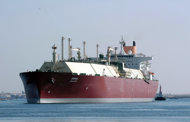Gas champion Qatar to diversify investments

State-owned Qatar Petroleum and Anglo-Dutch oil giant Shell aim to complete in 2012 the Pearl gas-to-liquids (GTL) plant at Ras Laffan Industrial City, north of the capital Doha.
The plant -- the world's largest facility of its kind which has taken up to 52,000 people to build -- delivered its first cargo of synthetic fuels in June.
Pearl will help Qatar make use of its abundance of gas reserves to produce a resource more scarce in the Gulf state -- oil.
The process is expensive and a high-CO2 emitter, however, as it consumes around 40 per cent of the gas to achieve liquid form.
But Shell has shown confidence in the method, which was developed in the United States, and has not hesitated to invest billions of dollars in the project.
"Over the last five years, Shell has invested almost 20 billion dollars in Qatar," Shell chief executive Peter Voser told AFP.
"It is a reflection of this nation's business climate that we feel confident to make such a large commitment," he said in Doha at the World Petroleum Congress, a forum for energy ministers and oil company executives.
This year the event is being hosted for the first time in the region which sits on 50 per cent of the world's hydrocarbon reserves.
Paradoxically, it is being held in the tiny emirate of Qatar which is home to an estimated 750,000 inhabitants -- most of them foreigners.
Qatar has grown rapidly over the past few years as dozens of skyscrapers have risen in the Gulf state thanks to its gas reserves -- the third-largest in the world after Iran and Russia.
In the 1990s, Qatar opened the door to American energy giant ExxonMobil -- which has the lion's share among international companies.
French counterpart Total also operates in the country, in addition to Shell and ConocoPhillips.
Qatar, a member of oil cartel OPEC, last year celebrated raising its production capacity for LNG to 77 million tonnes annually, boosting its position as the world's largest producer.
The Gulf emirate is, however, looking to diversify its resources with the United States turning to shale gas after it stopped importing LNG.
The United States is also considering exporting the gas trapped in underground rocks. Australia is also taking similar steps to serve Asian markets.
State-owned Qatar Petroleum and Shell on Sunday signed an agreement to build a petrochemical complex in the Gulf state valued at $6.4 billion.
The scope under consideration includes a world-scale steam cracker, with feedstock coming from natural gas projects in Qatar, in addition to a mono-ethylene glycol plant of up to 1.5 million tonnes per annum, 300 kilotonnes per annum of linear alpha olefins, and another olefin derivative, a joint statement said.
LNG revenues will pave the way for Qatar to become a major player in international financial, an aim proved by the Gulf state's shares in European giants such as Barclays Bank, Germany's Volkswagen, and Spain's Iberdrola.
What the stars mean:
★ Poor ★ ★ Promising ★★★ Good ★★★★ Very good ★★★★★ Exceptional
 Tag:
Tag:
Related Contents
Latest News
More News
- Cashless payments hit 28 times GDP in 2025 (February 04, 2026 | 18:09)
- SSIAM and DBJ launch Japan Vietnam Capital Fund (February 04, 2026 | 15:57)
- Banks target stronger profits, credit growth in 2026 (February 04, 2026 | 15:43)
- Vietnam on path to investment-grade rating (February 03, 2026 | 13:07)
- Consumer finance sector posts sharp profit growth (February 03, 2026 | 13:05)
- Insurance market building the next chapter of protection (February 02, 2026 | 11:16)
- NAB Innovation Centre underscores Vietnam’s appeal for tech investment (January 30, 2026 | 11:16)
- Vietnam strengthens public debt management with World Bank and IMF (January 30, 2026 | 11:00)
- Corporate bond market poised for stronger growth cycle (January 28, 2026 | 17:13)
- Vietnam's IPO market on recovery trajectory (January 28, 2026 | 17:04)






















 Mobile Version
Mobile Version